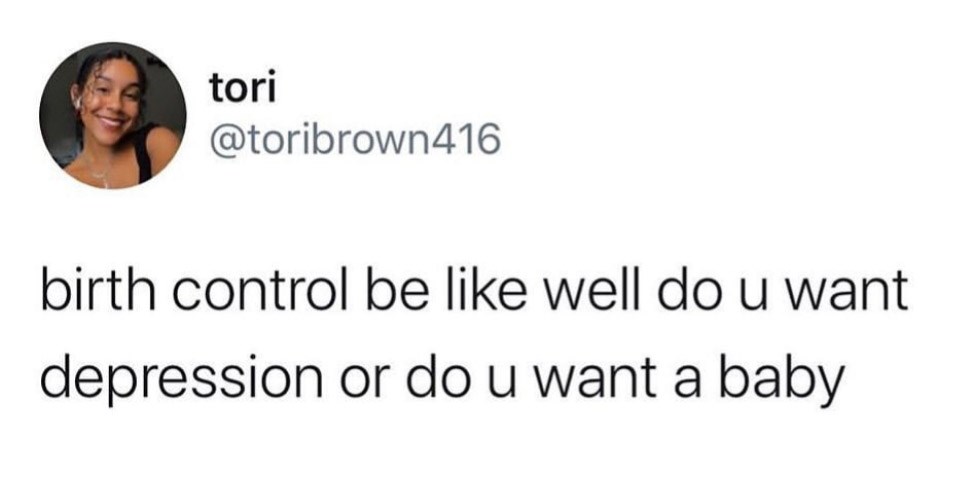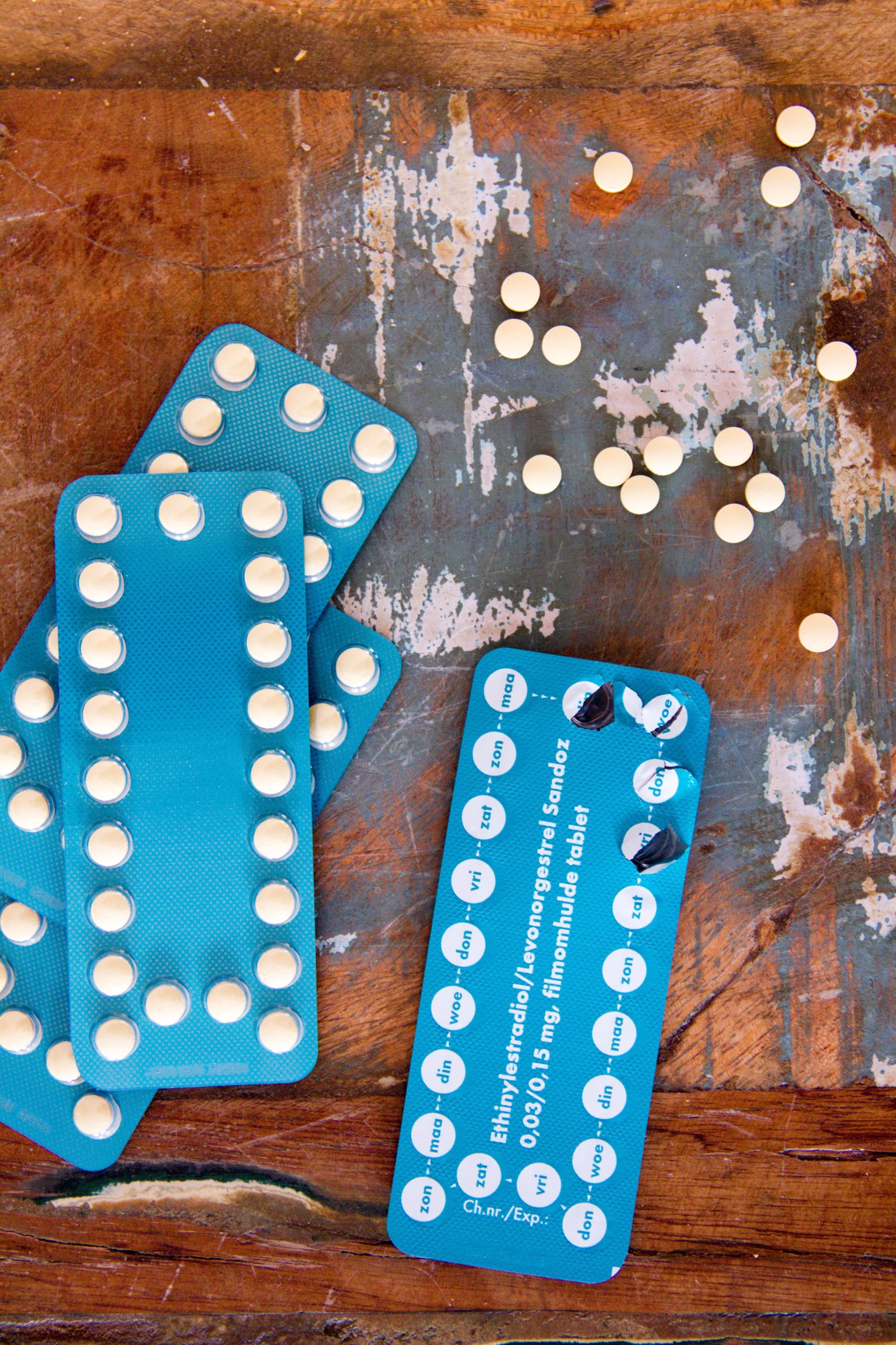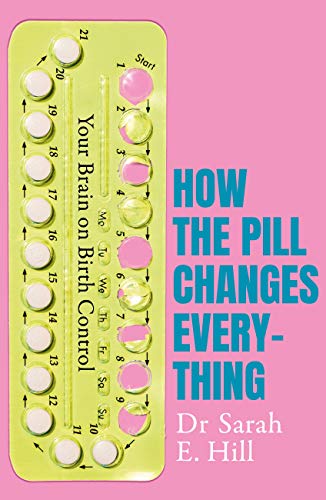On my never-ending quest of understanding the inner workings of my body, I’ve made it a mission to learn as much as I can about a topic that’s a bit taboo these days: female hormones and birth control.
Why? Well, for starters, it’s a pretty sensitive topic in today’s political climate. Women’s rights and access to birth control has been one of the most hotly debated topics in our government’s recent history. Many women argue that they want the freedom of body autonomy and better access to birth control. But what’s body autonomy without being fully informed of all the risks of the drug that we’re fighting for?
Another reason behind my research is my own personal experience with birth control. Simply put, I had a rough experience with it. I’ll spare you the details for now, but my journey is what kickstarted my interest on what really goes down when we decide to pump artificial hormones into our bodies.
…SO I TOOK IT TO THE ‘GRAM
I recently made a poll with my Instagram followers, just to get a general sense of how my following on hormonal birth control (BC) is handling it. It was… shocking. But not totally unpredictable.
Out of the people who responded, I got quite the mix of good and bad experiences.
THE GOOD
“Easier periods.”
“Regulated my acne.”
“Prevents pregnancy”
“Bigger boobs”
“regular periods”
THE BAD:
“depression for years”
“bipolar symptoms”
“Ectopic pregnancy.”… you’d be surprised at how many of these responses I got.
“gained weight”
“lost my personality”
“severe mood swings”
“suicidal tendencies”
“lost interest in everything”
“low sex drive”
“rashes and eczema”
“cystic body acne”
…the list goes on.
AND THE UGLY:
When I asked “Did you doctor inform you of these potential side effects?”
… over 90% of the answer was no.

Us ladies joke about PMS’ing, have normalized mood swings and even joke about getting depression on the pill (i.e. , the infamous meme above). But if we’re getting these types of side effects from BC, what else is it doing that we don’t see?
It’s been about half a century since the rise of hormonal contraception. But sadly, we somehow still have a blind spot for questioning the unintended consequences of changing a woman’s hormones – all in the name of pregnancy prevention.
HOW THE PILL CHANGES EVERYTHING
These thoughts led me to a few great books – one of them being How The Pill Changes Everything by expert psychologist Dr. Sarah Hill. In her infamous book, Dr Hill reveals the biological and societal science behind hormonal birth control, and how it’s really changing women (and actually changing the world) for better and for worse. Her witty commentary is relatable, straight-forward and makes you question everything you thought you knew about the pill.
Before I dive into my key takeaways, I want to make this very clear: this book (and specifically, this article) wasn’t written to persuade you to not take the pill or get off of hormones if you’re currently prescribed them. Please take a moment to re-read that sentence.
The mission behind this article is solely to inform, so you can make your own educated decisions with your health. Knowledge is power. And especially with something as delicate and precious as your hormones, every woman ought to have a deep understanding of how her biochemistry really works.
Do you want to learn more about who women become and how they act on the pill? Here’s my top takeaways from the book, How The Pill Changes Everything.
1. YOU CAN’T ALTER YOUR FERTILITY WITH THE PILL WITHOUT CHANGING EVERYTHING ELSE.
There’s one major theme that is echoed throughout the book, which is this: we can’t make a change in our body without it effecting the rest of our body systemically. And this is extremely important when it comes to synthetic hormones.
Hormones are signaling molecules that get made in one part of the body, then get released into the bloodstream, then picked up by any cells in the body that have matching receptors. Hormones have an active involvement in digestion, metabolism, sleep, mood, respiration, stress, and many more bodily functions (Hill, 37). Simply put, the primary job of hormones is to keep all of our bodily systems on the same page about what the body should be doing at any given moment of time. Think of them like a loudspeaker – they broadcast instructions for different cells in the body to hear. And they’re essential for survival.
While the pill was designed to have a targeted effect on the female reproductive system (ie., send a signal to brain, that sends a signal to pituitary gland, and then on to your ovaries), the pill simply doesn’t work that way. You cannot send a hormonal signal to only one part of the body. Whether you’re getting the birth control shot, have an IUD or taking a pill by mouth, those hormones end up everywhere. This is where *side effects* become prevalent in medications, although it’s even more so in ones dealing with your hormones since those receptors are located all over the body.
As Dr. Hill puts it, “It’s sort of like dropping an atomic bomb at your house to blow out a candle. Dropping a bomb off on a house will blow out a candle. It’s just that its effects are sufficiently… nonspecific… to make this a fairly unpopular way to deal with one’s candle extinguishing needs.”
No matter if your hormones are artificial or natural, any cell with those hormone receptors will pick those up. As Dr. Hill states, the brain and the rest of the body are too flush with hormone receptors for the pill not to change women. The pill affects these hormones which in turn helps modulate things like the immune system, stress response, gut hormones, self-control, emotional processing and eating behaviors and much, much more (Hill, 89).
TAKEAWAYS:
- You can’t send a targeted hormone signal to only one part of the body. Period. (No pun intended).
- You have hormone receptors all over the body that influence the immune system, gut microbiome, stress response, and much more.
2. THE PILL “MIMICS” THE SECOND HALF OF AN OVULATING FEMALE’S CYCLE.
Have you ever wondered how birth control pills work? Many of you probably may already know this, but here’s a little run-down just in case you don’t.
I’ll keep this as simple as possible because there’s multiple types of birth control pills, ranging in different levels of synthetic hormones in each. Simply put, the pill works mainly by mimicking the second half of a woman’s monthly cycle, or the luteal phase.
In non-pill taking women, the luteal phase is when the hormones estrogen and progesterone are high (with progesterone being the dominant leader). These high levels of hormones relay a message to the brain, telling it to NOT release hormones FSH and LH – the hormones that stimulate egg development.
In hormonal birth control, the primary active ingredient is progestin (artificial progesterone), which shuts down the brain’s signal (a release of hormones LH and FSH) that normally stimulates egg development. This higher level of progestin also thickens the cervical mucus to keep sperm from entering the uterus and also thins the uterus lining, so an egg is less likely to attach and get fertilized by sperm. The culmination of these effects makes the endometrium unfavorable for pregnancy.
The lesser-known thing about progestin (and this artificial game of ovulation telephone from the brain to the sex organs) is that, 1. Progestin in birth control doesn’t exactly fit the structure of our progesterone receptors, 2. We don’t know the precise message that artificial hormones are relaying throughout the body.
What does this mean? This means that progestin can potentially stimulate other receptors throughout the body, including those for testosterone (leading to masculinising effects), and for cortisol (which may dysregulate stress responses.) The stress hormone profile of pill-taking women, research suggests, is similar to people who have experienced chronic stress. Other research has found effects on the immune system, learning and memory.
TAKEAWAYS:
- Pill-taking women are in a mimicked “luteal” phase of their cycle 24/7.
- Progestin is known to stimulate receptors for other hormones unintentionally, like testosterone and cortisol.
- Consider when ovulating women’s PMS symptoms typically start… the luteal phase.
3. Women on the pill PRODUCE LESS ESTROGEN. Aka, the hormone that plays a role in most of our favorite things.
For women on the pill, their ovaries are not producing estrogen like they naturally do. Estrogen is the hormone that increases during the first half of a woman’s ovulation cycle. Women on the pill typically do not ovulate at all (but this depends on the type of BC used.) While there’s some smaller amounts of artificial estrogen present in hormonal BC– primarily to offset progestin’s potential unpleasant side-effects – your body isn’t going through its natural cycle of the rise and decline of estrogen.
Friendly reminder: estrogen is a key player in some of our favorite things. It’s what naturally makes us feel sexier, more outgoing, influences our sex drive, more energetic, heightens our sense of smell and taste, and can even influence who we pick as a mate. (Hill, 113)
Why is it important to understand this? Well, during what Dr. Hill calls the “artificial approximation of the luteal phase”, women on the pill may experience very similar behaviors and characteristics as to those in the luteal phase of their cycle (when progestin is highest). This can include a higher appetite (hello weight gain), lower sex drive (low/no estrogen), and a few other things we’ll touch upon below. And unfortunately, many women often feel the lack of estrogen without consciously recognizing its absence.
Takeaways:
- Women on the pill do not produce their own estrogen.
- Estrogen is a key player in everything “sexy.”
- Women often feel the “lack” of estrogen when they’re on the pill but do not consciously realize it.
4.The pill can influence your choice of mate
Estrogen is also known to nudge women’s preferences when it comes to their romantic partners. When women’s estrogen is highest during ovulation, brain cells sprout new connections (she refers to estrogen being like “MiracleGro” during this phase of the cycle.)
Studies show that during this time of the month, women typically favor qualities that are associated with masculinity and higher testosterone. Think square-cut jaws, broad shoulders and brow ridges. Additionally, when estrogen is high and conception is possible, your brain has the ability to discriminate between partners and the quality of their genes. (Hill, 116)
Research suggests that pill-taking women – i.e., those who are lacking the cyclical estrogen surge – are shown to prefer the faces of men who are less masculine. What does this mean? Well, if a woman chooses her partner when she’s on the pill and then goes off it, there’s a chance it might lead to a physical change in attraction to their partner.
Does this mean it’s the end of the world if you met your partner on the pill? ABSOLUTELY NOT. But Hill does suggest that it may be good to spend some time with your partner off other pill before making anything permanent in your relationship.
Takeaways:
- During ovulation when estrogen is high, our brain can discriminate between more desirable and less desirable potential partners.
- Estrogen loves testosterone – when estrogen is high, we tend to prefer men with more testosterone-ific qualities (i.e., classically defined masculine qualities).
5. The pill can potentially mess with your fertility and children’s health.
*Full-disclosure, she mentions in bold that there is NOT enough research on this. Use your judgement and let this marinate before you jump to anything drastic.
Because your brain on the pill does not have the same estrogen-driven discernment you would otherwise normally possess when choosing your partner, Dr. Hill states that women who meet their partners while on the pill are at greater risk for choosing genetically incompatible partners. She links this to fertility, and mentions that pill-taking women may also have difficulty with pregnancy (Hill, 117). This link to fertility is also related to the fact that women on the pill may have greater success with their career (due to the fact they don’t need to worry about pregnancy) and may ultimately push the baby-making to later on in life when conception is known to be harder.
Dr. Hill also references a recent study that suggests that meeting your partner on the pill may be predictive of more health problems for your children (Hill, 118). She brings up a study done by 192 mothers with one child between one and eight years old. Out of all the participants, one-third of them met their partners while on the pill.
When comparing the health of the children born to the couples who met on the pill and the ones who met without it, the researchers found out that the children born to the couples who met on the pill had poorer overall health (Hill, 118). The children were, “…more prone to infection, had worse perceived health than their peers, had taken more trips to see the doctor in the past three months and in the past year, and were sick more often than the children born to couples who met without the influences of the pill.” (Hill, 118).
But take a deep breath, there could have been a million different factors playing into these results, but it’s an important correlation to consider nonetheless. Correlation does not equal causation but the association is certainly there.
Takeaways:
- Women on the pill may not be able to differentiate between potential partners the same way ovulating women do, due to lack of the estrogen surge each month.
- There’s *a chance* this could be linked to problems with fertility and health of children.
6. BEING ON THE PILL IS ASSOCIATED WITH AN INCREASED RISK OF BEING DIAGNOSED WITH ANXIETY AND DEPRESSION – AND EVEN MORE SO IN WOMEN AGED 15-19.
Here’s one sad aspect of the pill that isn’t addressed nearly enough. Studies show that being on the pill is associated with an increased risk of being diagnosed with anxiety and depression. The scary part? The association was much higher in young women aged 15-19, with their suicide risk being more than twice that of non-pill takers.
A dysregulated stress response is another known effect of the pill and may likely be a part of the depression/anxiety picture. Dr Hill states that another driver of these side effects seems to be low levels of the neurosteroid allopregnanolone – a breakdown product of progesterone that acts as a natural sedative. This research suggests that with women who are on the pill, their levels of this molecule are significantly lower than in naturally cycling women.
Of course, there are exceptions to the general rule. Indeed, there are still many women who report that the pill stabilizes their moods. But it’s extremely important to remember point number three above – women don’t produce their body’s natural, monthly surge of estrogen when they’re on the pill. Your mental state is constantly in the last two weeks of your “cycle” and you don’t have the monthly ebb and flow of progestin and estrogen.
Every single woman on this planet has different naturally occurring levels of hormones in their body, which explains why some people do well on the pill while others may have mild to extreme symptoms.
SO WHAT DO I DO WITH ALL THIS INFORMATION?
First and foremost, read the book. Every page had a key takeaway, but I’d rather you read her book and soak it up for yourself.
In short – I give this book a 5 out of 5. If you’re a woman, (and men – I’d consider reading this to get a better understanding of us biological females) this is a must read.
As mentioned above, I’m not trying to persuade anyone to get off of the pill (although, I can say for sure that you’ll never find me on hormonal birth control again.) And I am definitely not making health recommendations to anyone reading this article. But I encourage you to really get a deep understanding of your inner-workings and be more conscious of the medications you decide to take, specifically with ones that deal with your precious hormones.
For me, this book solidifies the fact that there’s not nearly enough research done on what synthetic hormones and birth control do to the brain and body. I think ladies are fighting the wrong fight when it comes to birth control – we need more research, more *safe* options and more transparency when it comes to taking the pill. A woman’s right to choose should be made with full information, both the good and the bad. Otherwise you’re advocating for unintended consequences and potentially disastrous effects on your wellbeing.
Each one of us has different life goals, different priorities, and different biochemistries. Understanding how the pill works, how our cycle works and being aware of the potential side-effects are important for deciding whether it’s right for you or not.
As I said before, knowledge is power. Specifically when it comes to understanding our body. We are quite literally the workings of our hormones – so I encourage you to take the time to read the book, reflect on your unique experience, and use the power of your hormones to live the life you’re meant to live.
source:
Hill, Sarah E. How the Pill Changes Everything: Your Brain on Birth Control. Orion Spring, 2019.
This article is for informational purposes only, regardless of a professional’s quotes and studies throughout the article. This article is not, nor is it intended to be, a substitute for professional medical advice, diagnosis, or treatment and should never be relied upon for specific medical advice.







Read the Comments +